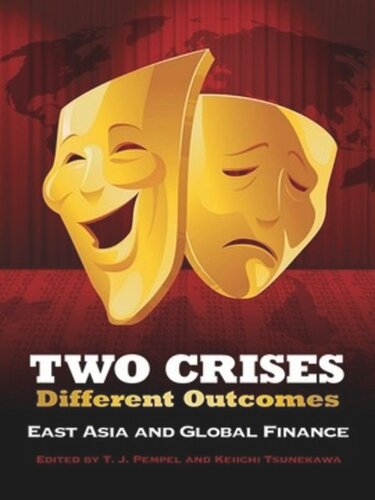

Most ebook files are in PDF format, so you can easily read them using various software such as Foxit Reader or directly on the Google Chrome browser.
Some ebook files are released by publishers in other formats such as .awz, .mobi, .epub, .fb2, etc. You may need to install specific software to read these formats on mobile/PC, such as Calibre.
Please read the tutorial at this link: https://ebookbell.com/faq
We offer FREE conversion to the popular formats you request; however, this may take some time. Therefore, right after payment, please email us, and we will try to provide the service as quickly as possible.
For some exceptional file formats or broken links (if any), please refrain from opening any disputes. Instead, email us first, and we will try to assist within a maximum of 6 hours.
EbookBell Team

4.1
30 reviewsTwo Crises, Different Outcomes examines East Asian policy reactions to the two major crises of the last fifteen years: the global financial crisis of 2008–9 and the Asian financial crisis of 1997–98. The calamity of the late 1990s saw a massive meltdown concentrated in East Asia. In stark contrast, East Asia avoided the worst effects of the Lehman Brothers collapse, incurring relatively little damage when compared to the financial devastation unleashed on North America and Europe. Much had changed across the intervening decade, not least that China rather than Japan had become the locomotive of regional growth, and that the East Asian economies had taken numerous steps to buffer their financial structures and regulatory regimes. This time, Asia avoided disaster; it bounced back quickly after the initial hit and has been growing in a resilient fashion ever since.The authors of this book explain how the earlier financial crisis affected Asian economies, why government reactions differed so widely during that crisis, and how Asian economies weathered the Great Recession. Drawing on a mixture of single-country expertise and comparative analysis, they conclude by assessing the long-term prospects that Asian countries will continue their recent success.Contributors: Muhamad Chatib Basri, Minister of Finance of the Republic of Indonesia and Professor of Economics at the University of Indonesia; Yun-han Chu, Institute of Political Science, Academia Sinica; Richard Doner, Emory University; Barry Naughton, University of California, San Diego; Yasunobu Okabe, Japan International Cooperation Agency Research Institute; T. J. Pempel, University of California, Berkeley; Thomas Pepinsky, Cornell University; Keiichi Tsunekawa, National Graduate Institute for Policy Studies, Tokyo